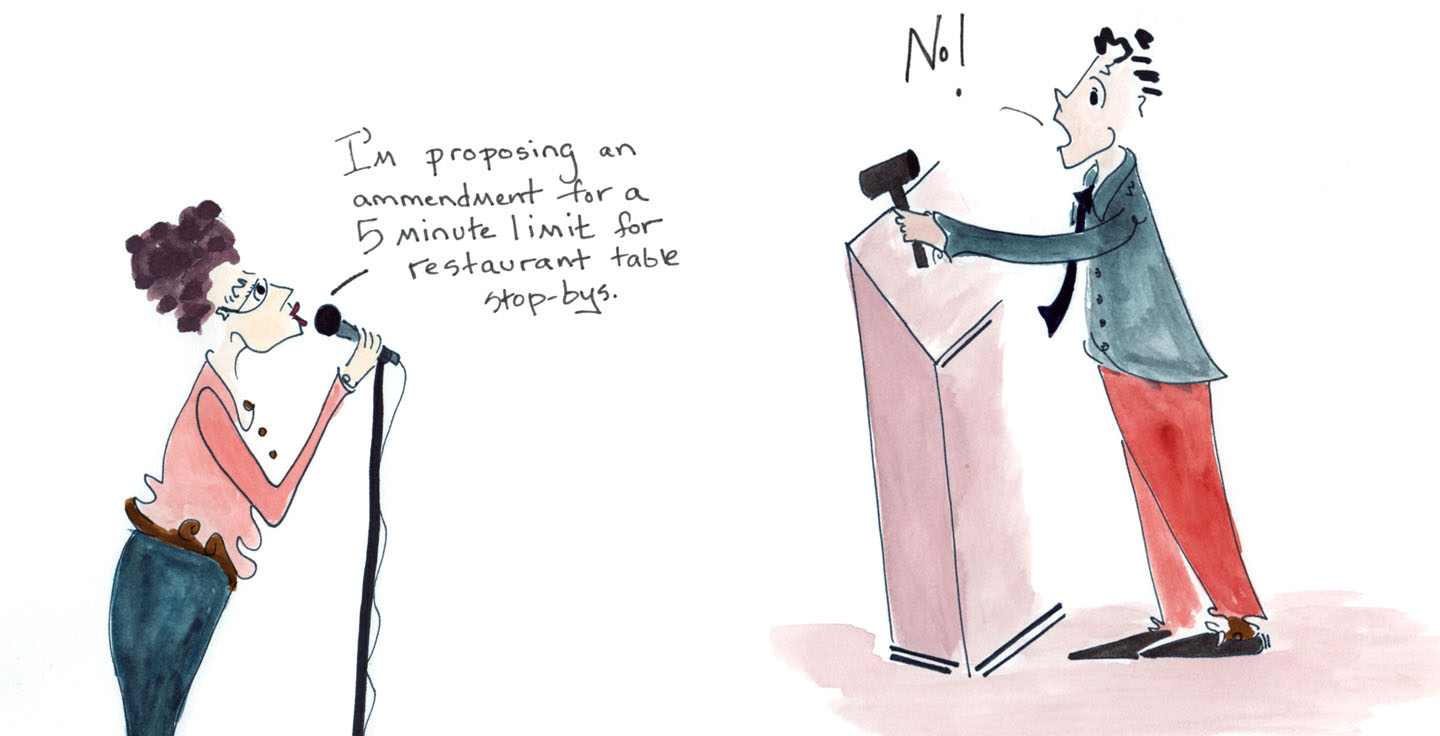Illustration by Kate Feiffer
Bemused readers ask novelist Nicole Galland for her take on navigating the precarious social landscape that comes with living on the Vineyard. Nicole, who grew up in West Tisbury, is known locally as the co-founder of Shakespeare for the Masses at the Vineyard Playhouse. Her combined knowledge of both this Island and the world’s greatest melodramas compels her to help prevent unnecessary tragedy wherever possible. Nicole’s latest novel, “Stepdog,” has recently been published. Trying to untangle a messy Island ethics or etiquette question? Send it to OnIsland@mvtimes.com.
Dear Nicole,
My husband and I both know a lot of people on the Island, and when we eat out, there are generally people at the restaurant whom we know. People often stop by our table, or we stop by theirs, to say hello. When we stop by someone’s table, we purposefully keep it short and friendly. On too many occasions, however, someone comes by our table to say hello and then continues to stand there and chatter on through much of our meal. Naturally, this is not a big problem, given the world’s issues, but on this Island it’s a common one. Don’t you think it’s time for some rules of the restaurants here?
Confidentially Yours,
Diner
Dear Diner,
Queries including “Don’t you think it’s time for some rules …” always make me nervous, in part because making something a rule requires it to be brought up at town meeting, where it would steal focus from more important things like affordable housing. So no, I don’t think there should be a rule. But I do think there should be a strategy for dealing with people who are too self-involved and/or clueless to realize when they are being (and I mean this in the nicest way possible) a boor. Or a bore.
Ultimately the solution is, “Let them know you do not want to continue talking to them.” If they’re enjoying the status quo and you’re not, they have no motivation to change it, so it’s up to you. But there are various ways to communicate that, and some are kinder than others. Kindness matters in a small community. Generally, there are two ways to give someone (let’s call him Frank) the Restaurant Brush-Off. One approach makes Frank feel like an unwanted outcast, and the other makes him feel like he’s your appreciated intimate who’s socially savvy, even if he’s not. Guess which one I’m about to advocate for?
The bluntest approach is “We’re trying to have a quiet dinner alone,” but while that is honest, it’s not very gracious, so don’t say that. The blunt approach sounds like you’re correcting Frank, maybe even chastising him for actively doing something wrong; he’s likely to slink away feeling uncouth, and who wants to make another person feel uncouth? (If you were comfortable doing that, my guess is you’d just do it, rather than writing me for advice.)
In contrast, try something like the following — and be sure to use a little confiding smile, or this approach won’t work. Say something like, “This is the first time my husband and I have even seen each other since the Derby started, so we’re feeling a little antisocial, if you get my drift,” or “This is a very rare date night for us — you know what those are like, right? — and the babysitter needs us home by 10.” Something that suggests to Frank that there’s a private, time-sensitive Thing going on with you and your spouse, that you trust him to understand because he’s that kind of guy. Things that Frank feels he’s getting privileged information about, ’cuz, y’know, he’s a buddy. This way, he gets the message to leave you alone in a manner that lets him feel like an insider, by the very act of your dismissing him. (Hence the importance of the confiding smile.) He’s contributing to your having a good evening because he’s going to leave you alone now! Isn’t Frank awesome? Bet none of the other people who try to chat you up all evening have half the sensitivity or understanding that he does. “Good ol’ Frank,” thinks Frank as he returns to his own table.
He would never get to feel that if you’d just said, “We’re trying to have a quiet dinner alone here.”
Is this dishonest? In a way. It’s the kind of dishonesty that occurs when you ask someone, “How are you?” and they reply “Fine,” even if they’re not fine (which they probably aren’t if it’s, say, February). It’s the kind of dishonesty practiced when somebody says “Have a nice day” even though 99.9 percent of the time, they don’t care what kind of day you have. It’s the white-lie dishonesty of social graciousness, and it helps ensure we all feel good about sharing the same small Island with one another.
That’s my take.
Nicole
This article by Nicole Galland originally appeared on mvtimes.com.




